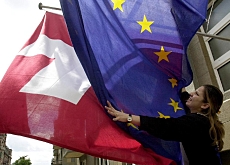
EU stands firm on bilateral accords

The European Union insists that a security accord with Switzerland can only come into force if voters approve a proposal to extend a labour deal.
Some Swiss politicians have denied that the agreements – part of two sets of bilateral treaties – are directly related.
Officials in Brussels have shown little understanding for the outcry in Switzerland over a statement by the EU foreign-affairs commissioner, Benita Ferrero-Waldner.
She said that Switzerland could only participate in the passport-free Schengen zone if voters come out in favour of opening the Swiss labour market to the ten new EU member states.
A nationwide vote on the issue is scheduled to be held on September 25. On Sunday the Swiss electorate approved the Schengen/Dublin accords on closer security and asylum cooperation with the EU.
The agreements are part of two sets of bilateral treaties signed in 2000 and 2004.
Political wrangling
“Legally the treaties [on Schengen/Dublin and the labour accord] are not tied together, but they are related on a political and practical level,” said a spokeswoman for Ferrero-Waldner on Tuesday.
Unnamed EU officials said the Schengen agreement is considered a logical extension of opening up the labour market.
“Access to the labour market is the basis for a passport-free zone in Europe, allowing the free movement of people,” they said.
Some EU member states do not participate in the Schengen/Dublin accords. But no country in the passport-free zone restricts access to its labour market for EU citizens, according to a spokesman for EU Justice Commissioner Franco Frattini.
Under EU regulations the ten new EU member states which joined in May 2004 can help decide when the security cooperation with Switzerland will take effect.
These countries, including Poland, the Czech Republic and Malta, could block implementation of Schengen.
It is widely assumed that they would not appreciate Switzerland’s refusal to open up its labour market.
Negotiations
“Those who participated in negotiations between Switzerland and the EU were aware that [Schengen/Dublin and the labour treaty] are related,” said Frattini’s spokesman.
On Monday, the Swiss foreign minister, Micheline Calmy-Rey, and the justice minister, Christoph Blocher, said they were surprised by Ferrero-Waldner’s comments.
Monique Jametti Greiner, Switzerland’s chief negotiator for the Schengen dossier, confirmed the link with the labour accord.
She believes that, in theory, the police cooperation could come into effect even if Swiss voters reject a proposal to extend the labour accord.
But she told swissinfo that the issue would have to be resolved “at a political level”.
Swiss Economics Minister Joseph Deiss said on Tuesday that the EU always had the option of linking the two issues.
He added that the Swiss government had repeatedly warned that Brussels would not accept any discrimination of its member states.
swissinfo
On June 5 Swiss voters approved the Schengen/Dublin accords on closer security and asylum cooperation with the EU.
On September 25 the electorate will have the final word on a proposal to open the Swiss labour market to the ten EU member states.
They are part of a series of bilateral accords between Switzerland and the EU.
Only three of the nine treaties of the second set of bilateral accords have been fully approved: Taxation of savings, processed agricultural products and pensions.
The dossiers on environment, statistics as well as security and asylum cooperation have yet to clear the final hurdles.
The dossiers on customs fraud and media still have to be ratified by the EU and Switzerland.

In compliance with the JTI standards
More: SWI swissinfo.ch certified by the Journalism Trust Initiative




























You can find an overview of ongoing debates with our journalists here . Please join us!
If you want to start a conversation about a topic raised in this article or want to report factual errors, email us at english@swissinfo.ch.